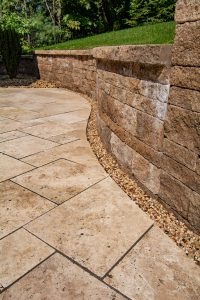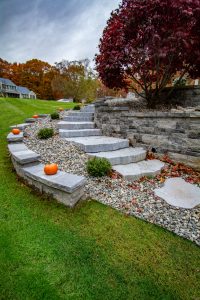
Sustainable Hardscape Materials and Practices
Hardscaping can elevate your property’s exterior and make it look beautiful and sophisticated. However, if you aren’t conscientious in your design and selection of materials, you can inadvertently create a negative impact on the environment through your renovations. The designers at Triad Associates are experts in sustainable hardscape materials and design, and they can guide you through an eco-friendly approach for any project you have in mind.
What is Sustainable Hardscaping?
Sustainable hardscaping incorporates both design practices and materials. The design should take drainage, soil health, and other factors into account, while the materials should be sustainably sourced whenever possible. The goal should be to protect the local environment and to reduce waste and pollution when possible.
Benefits of Sustainable Hardscape Materials
Improved Drainage
Good drainage is key to soil health and to supporting native plants and local wildlife. Using sustainable hardscape materials like gravel, organic mulch, and permeable pavers can make it easier for water to drain properly, thereby protecting soil health.
Reduced Carbon Footprint
Sustainable hardscape materials also include those that do not require intense manufacturing processes or harmful chemicals, like treated mulch, asphalt, or polished and manufactured stone. Using sustainable materials reduces your project’s carbon footprint, which helps the environment.
Promotes a Natural Look
Sustainable materials often are made of natural materials, such as wood, sand, and stone. Using them promotes a natural look that is not only beautiful to many, but is also less obtrusive to the surroundings.
Sustainable Hardscape Materials
Permeable Pavers
Permeable pavers are those that have some porosity so that water can flow through them instead of over them. A permeable paver surface can also include non-permeable pavers that are laid over a bed of sand and gravel and leaving space between the pavers, allowing for proper drainage.
Recycled Materials
Materials can also be made sustainable just by reusing them or making them from recycled materials. Anything that doesn’t contribute to the production of new materials can be considered sustainable. For hardscaping, look for pavers or other material that have been recycled from old concrete, plastic, rubber, or other materials.
Natural Stone
 Items found in nature are sustainable, so long as they are not depleting resources. Use natural stone that has not been overly manipulated, such as through excessive polishing and cutting, and you’ll have a sustainable material.
Items found in nature are sustainable, so long as they are not depleting resources. Use natural stone that has not been overly manipulated, such as through excessive polishing and cutting, and you’ll have a sustainable material.



